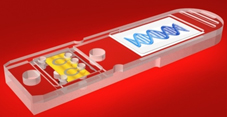Diagnosis of disease is of paramount importance for rapid administration of appropriate therapy. Traditional methods such as culture, morphological examination of tissue samples and ELISA are time consuming and labour intensive. We work on technology that can provide a rapid, label-free method of detection and identification and has the potential for applications both in centralised testing laboratories and for on site testing using simple, low cost products. In addition, the techniques works without the need for labelling or extensive sample preparation; for example it can be applied to whole blood samples.
In addition to chemistry, surface chemistry, biology and infectious disease resources we access the Australian Nanotechnology Fabrication Facility, which provides a dedicated facility for the synthesis, processing, characterisation and fabrication of functional organics and organic semiconductors, new generation photoresists, functional polymers and nanoparticles and bio-inspired nanomaterials, smart surfaces and microdevices. Services include the scale-up prototyping of devices such as organic solar cells, organic light emitting diodes, organic circuit elements, microfluidic devices, bioassay platforms, biomaterial scaffolds and microbioreactors.
The node consists of two facilities, the Soft Materials Processing Facility and the BioNano Device Fabrication Facility. The facilities are based at the University of Queensland in purpose-built laboratories in the Australian Institute for Bioengineering and Nanotechnology (AIBN) and the School of Chemistry's Centre for Organic Photonics and Electronics (COPE).
|
![]()
